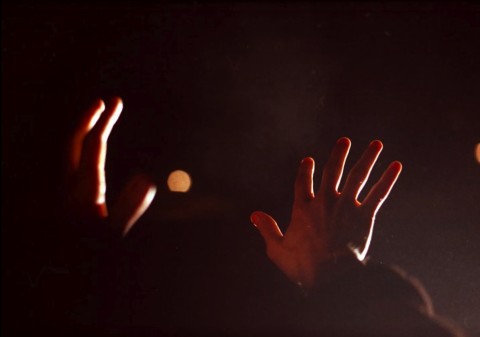You see her for the first time at the bombed-out grocery store. She’s pushing past teenagers to snatch at the last of the canned food, and right away you notice the high, healthy glow of her face. But you look away quickly. You’re too busy hunting for something with acetaminophen, or even ibuprofen, for your feverish newborn. Your wife hissed at you: no ibuprofen for infants under 6 months old. Still, you figure at this point something is better than nothing, right? Turns out it doesn’t matter. There’s nothing left in the pharmacy aisle.
Two days later, there she is again, sprinting down the ruined asphalt you used to think of as my street, as in, “My street is Woodland Avenue, the one across from the forest preserve.” Now it’s the street, as in, “Don’t go in the street.” As in, “Would you stop going into the street for cartridges, would you stop going into the street for ibuprofen, would you stop going into the street and leaving me with this child?” While you peer at the woman through your living room window, your mind rockets back to the grocery store. You didn’t register it at the time, but now you can picture the way she bent over to snatch an overlooked can of yellow wax beans from the bottom shelf, the firm swath of meat on her bones.
As your wife flattens the baby against the floor, you watch a spangle of gunfire shred the leaves above the street. You hold your breath and wait for the woman to stagger, wait for a geyser to burst from the dip in her clavicle, but she flies unharmed beneath the sizzling trees. You should duck and hide, but you watch her run. You haven’t seen a healthy woman in so long. Her hair is smooth, her skin is plump and damp. And you hate yourself for noticing this, while your wife nearly suffocates the feverish child with her body, but the woman has a lovely ass, beating like a pair of wings over the asphalt.
She bounds away, leaving you staring out into the wounded street. “Is it safe?” your wife whispers. You say, “Not yet,” and watch the street some more.
You feel so guilty for thinking of her now, at night. But for the first time in months, you’re distracted from your wife’s face, which has a habit of looming above you in the darkness, distorted by sleep, crying, Save me. You never would have guessed that horror could carve your pretty wife into a stranger, but it did, and she is. You hate to look at her now, with the grooves on either side of her mouth and the patch of gray hair sprouting above her left ear. All she can talk about are the things she’s lost. Her voice is a funereal bell that won’t shut up. You want to shake her and say, What I’ve lost is you. And when she cries and cries, the grooves in her face deepening, you’ll say, And what you lost is me.
Turns out you aren’t the only one who’s noticed the healthy stranger. You go over to your neighbors’ house to make a few minor trades with the husband. Well, it’s your old neighbors’ house. Your new neighbors clambered in through your old neighbors’ shattered windows, looking for a place to camp out. When they discovered your old neighbors, they did the honorable thing, you thought, in giving them a proper backyard burial.
Anyway, you give the husband a cup of flour and he gives you an orange, so that your baby can have some vitamin C, and the two of you get to talking. Your new neighbor knows more than you do: the woman is squatting at 3837 Woodland. He knows because he saw her foraging for mushrooms down by the railroad tracks and watched her run home. “She bent over. For each mushroom,” he says, with great solemnity. You mutter, “But that area is so exposed,” and he laughs raucously. But that’s not what you meant. You were thinking of the railroad tracks, and how the slightest movement invites gunfire—how this can’t be a world that would mow down a pretty stranger, it just can’t.
You don’t mean to walk down there. You don’t mean to go into the street. But you tell yourself that the couple who used to live at 3837 Woodland had a really great vegetable garden. And maybe some of that bounty is left.



 The core workshop of SmokeLong Fitness is all in writing, so you can take part from anywhere at anytime. We are excited about creating a supportive, consistent and structured environment for flash writers to work on their craft in a community. We are thrilled and proud to say that our workshop participants have won, placed, or been listed in every major flash competition. Community works.
The core workshop of SmokeLong Fitness is all in writing, so you can take part from anywhere at anytime. We are excited about creating a supportive, consistent and structured environment for flash writers to work on their craft in a community. We are thrilled and proud to say that our workshop participants have won, placed, or been listed in every major flash competition. Community works.